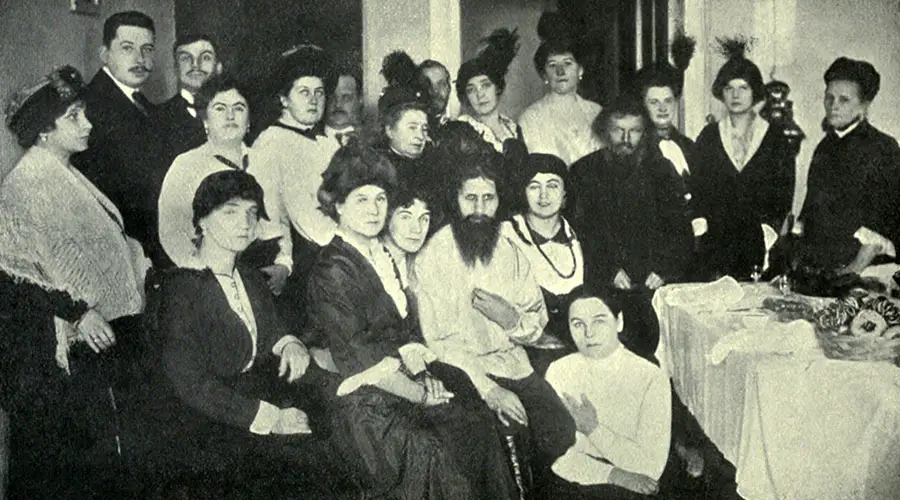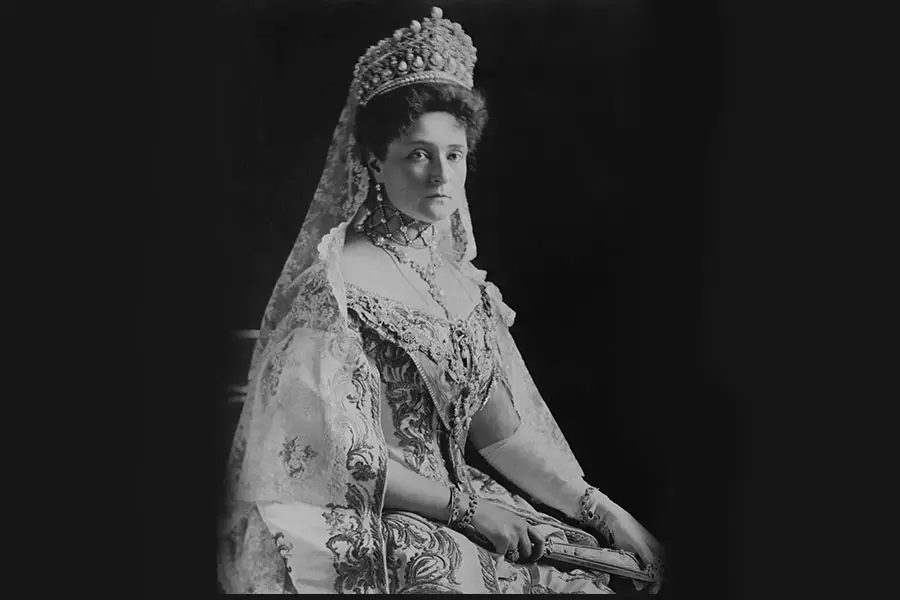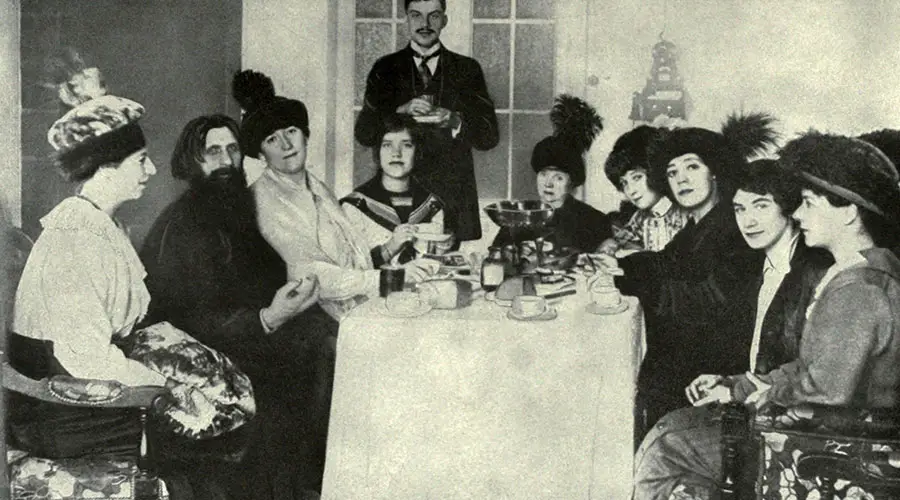Known as the Mad Monk, Rasputin lived from 1869 until his murder in 1916, and for a brief time became incredibly influential in the Russian palace of the ruling Romanov family. But why is Rasputin so famous, and continues to garner so much interest?
Rasputin is famous because the Russian Tsarist family believed he could cure their hemophiliac son. Charismatic and a great networker, Rasputin made his way to the Russian palace, where he became highly influential. His is known for his intense gaze, and otherworldly libido.
However his fame seems to go beyond merely being an interesting figure in Russian history. Just as he captivated his followers during his life, there is a curious quality to his personae that stirs the imagination of the human psyche. Perhaps that’s because he did seem to possess some degree of supernatural abilities.

1) Rasputin appeared to heal the Tsar’s baby son of hemophilia
In 1906 he became the healer for the imperial couple’s son Alexei, who had hemophilia. He was introduced to Russian Tsar Nicholas II and his wife Alexandra Feodorovna as a mystic and healer. When the presence of this new holy man seemed to be helping the health of their young son, Alexei, they became deeply loyal, in particular Alexandra. In one important moment in 1912, the young Alexei was in critical condition. Rasputin was on a trip to his home village, and Alexandra sent a letter to him asking for his help. He responded that god is helping the boy, and to not let the doctors do too much. Shortly after the condition of the young boy improved, and from this moment Alexandra was passionately devoted the Rasputin.
2) Rasputin ingratiated himself into the Imperialist Palace of the Tsar
Healing the son of the Tsar was the single most important aspect of his presence in the palace, though he ingratiated himself deeply in many ways, causing controversy and enemies. The Tsar appointed him the lamp lighter of the palace, which involved keeping all the various lamps alit, and made Rasputin’s presence a constant in the palace. Within the court he was considered a mystic, visionary, and prophet by his allies, while disliked by the religious authorities and secret police.
Rasputin’s influence reached its peak when Nicholas II took command of the Russian Army in 1915, leaving his wife Alexandra in charge of palace, which meant in effect Rasputin was the most powerful man in the Russia palace at that moment, as Alexandra was utterly devoted to his authority.

3) Rasputin Seemed to have possessed some degree of supernatural ability
Perhaps part of the reason Rasputin is so famous is that he really did possess some sort of supernatural abilities. To the many people who came in contact with, he seemed to. Certainly, Tsarist Alexandra had no doubt in his supernatural abilities. As a child, Rasputin correctly identified a horse thief while lying sick in bed. His foretelling that as long as he is alive the royal family will be too turned out to be correct, as a few weeks after Rasputin was murdered, the ruling families’ reign came to an end.
4) Rasputin had a massive libido
As Rasputin made his presence felt in the royal court, rumours or countless affairs abounded. Certainly, he was sleeping with Tsarist Alexandra, and probably countless others at the same time. Prior to his time in St. Petersburg, he had led a small group of spiritual followers. He preached that through sexual exhaustion divinity could be found. Meeting and praying in a small chapel at his father’s house, Rasputin’s female followers would ceremonially bathe him prior to his meetings. In almost every existing photo of Rasputin, he is surrounded by large groups of female devotees. Perhaps through his intense libido, as well as his intense gaze, he was able to so profoundly impact Tsarist Alexandra, as well as his other female followers.
5) Rasputin climbed the ranks of the Eastern Orthodox faith
In 1897, at the age of 28, Rasputin began his religious pilgrimage, travelling to St. Nicholas Monastery at Verkhoturye. He became a vegetarian and began regularly praying. During his three month stay at the monastery he was introduced to the Khlysty sect, who were known for orgies.
In 1905 Rasputin went to the city of Kazan, where he was introduced to the father superior of the Seven Lakes Monastery, as well as other prominent Bishops and Archimandrites. Impressed by the young holy man, they introduced him to connections in St. Petersburg, and helped him travel there.
In St. Petersburg, Rasputin was introduced to Archimandrite Theofan, who was very well-connected in St. Petersburg society, even serving as the confessor to the tsar and his wife. Rasputin stayed in the house of Theofan, who became one of Rasputin’s most important contacts, introducing him to the salons where the aristocracy were gathering for spiritual and theosophical discussion.
Evidently, Rasputin was an excellent networker. He must have been highly charismatic, and driven by his ambition for power and influence, was able to befriend and impress the right people, eventually making it all the way to the palace. Tsar Nicholas described meeting Rasputin as follows:
“A few days ago I received a peasant from the Tobolsk district, Grigori Rasputin, who brought me an icon of St. Simon Verkhoturie. He made a remarkably strong impression both on Her Majesty and on myself, so that instead of five minutes our conversation went on for more than an hour.” – Tsar Nicholas II
6) Rasputin seemed supernaturally difficult to kill
Adding so much to the mysterious legacy of Rasputin was his unusual death, in which he proved almost impossible to kill. Rasputin was assassinated by a group of noblemen, led by Prince Felix Yusupov, the richest man in Russia at the time. At first they tried to poison him, offering him tea and cakes laced with cyanide. This seemed to have no effect, and Rasputin requested wine, which they brought him, laced with more poison. At 2:30 in the morning, after drinking several glasses of wine, Rasputin showed no effect of being poisoned, so the men got a gun and shot him in in the chest. Later that night, Yusupov returned to the basement to ensure Rasputin was dead, when Rasputin leapt up and attacked him. Yusupov fled upstairs with Rasputin in pursuit, before Rasputin was shot in the courtyard by Yusopov’s co-conspirators.

7) Rasputin was immortalized in the 1978 song by Boney M.
German Eurodisco group Boney M. released a song about Rasputin, describing his hedonism, mysticism, and political influence. The song was a worldwide hit, reaching number 1 in many countries, and continues to be heard from time to time to this day.
When Boney M toured Russia in the year 2000, one of the bands singers mysteriously died in a hotel room in St. Petersburg. The singer had no pre-existing health conditions and had simply gone to sleep in the hotel. Incredibly, this night was the anniversary of the death of Rasputin.
8) Rasputin embodies an archetype that stirs our imaginations
Rasputin started his life as a peasant and became a highly influential man in the world of Russian politics, but that doesn’t quite explain his fame. Perhaps, like the woman who fell under the spell of his intense gaze, there is something about the man that captures the imagination of the audience at large. There is something about a holy man, with the ability to heal and to predict the future, with an unrelenting appetite for sex, as well as for power and influence, that speaks to human psyche.
Recommended Reading
If you want to continue exploring this subject more deeply, you can see which books I recommend by clicking here.
